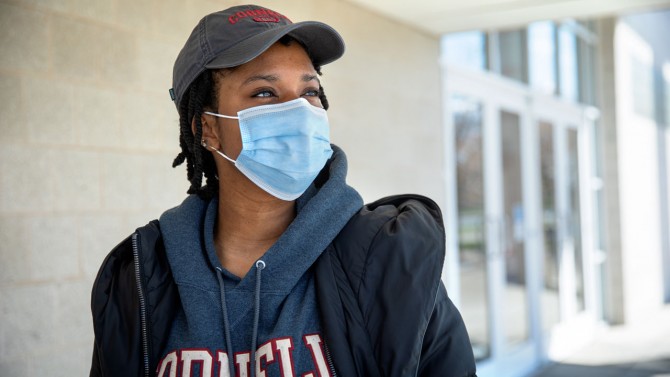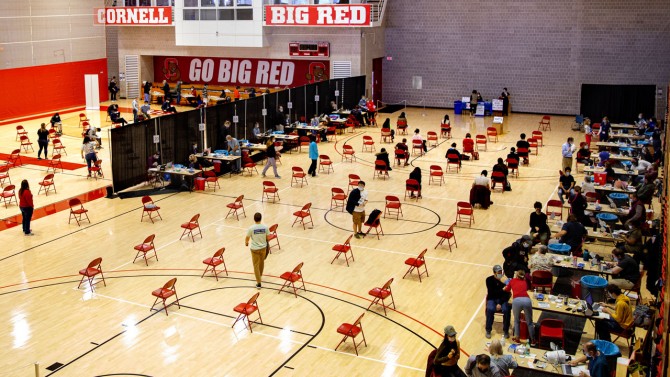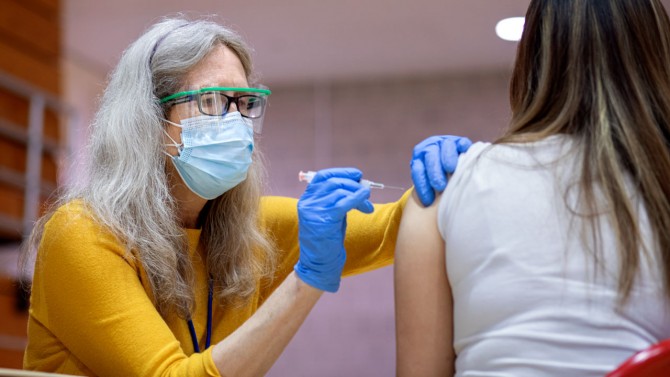In partnership with Cayuga Health System and the Tompkins County Health Department, Cornell University hosted a vaccine clinic April 23 in Bartels Hall.
Campus clinic eases student access to COVID-19 vaccine
By James Dean
Lacking a car or bus pass to help her reach local vaccination sites, Caprice Pierre ’21 had planned to wait until returning home to New Jersey after graduation to get a COVID-19 vaccine.
But when Cornell offered a clinic on campus April 23, it was easy for the nutritional sciences major to walk from her North Campus residence to Bartels Hall to receive a first dose of the Moderna vaccine.
“It’s really important that the clinic was on campus,” Pierre said. “Otherwise, it would have been a lot more work and I would have postponed it even longer.”
Pierre was one of about 650 members of the campus community – primarily students – who received vaccines at the first clinic hosted by the university in partnership with Cayuga Health System and the Tompkins County Health Department. A follow-up clinic to administer second doses is scheduled for May 25 – between final exams and Commencement weekend.
“We have to go where people are,” said Frank Kruppa, Tompkins County public health director. “Students that might not have been able to get to the mall (clinic), or might have been on the fence about whether they were going to get vaccinated, they have this easy opportunity to get vaccinated right here on campus and be protected.”
Added Dr. Martin Stallone, chief executive officer of Cayuga Health System: “Our ability to respond and mobilize quickly to administer vaccine to support Cornell University is critical to ensuring more students get vaccinated in the community. Since the beginning of the pandemic, the collaboration between Tompkins County, Cornell and other organizations has allowed us to work comprehensively as a community responding to COVID-19.”
As of April 25, 44% of Cornell’s on-campus population had received at least one vaccine dose, according to a university dashboard, including nearly 5,800 students who had uploaded proof of vaccination through the Daily Check site – a requirement for the fall semester.
Ryan Lombardi, vice president for student and campus life, said that while many students have already sought vaccines off campus, others haven’t had the time or resources to do so.
“We thought it was really important to provide an opportunity on campus where it was as convenient as possible for our student population,” he said.
Running from 8 a.m. to 4 p.m., the clinic was held at the start of a long weekend of Wellness Days that cleared students’ schedules of classes and other obligations, eliminating another potential obstacle.
“It reduced many of those barriers – the transportation, the proximity, as well as just what’s going on here on campus,” said Dr. Anne Jones ’04, director of medical services at Cornell Health and COVID-19 public health officer. “It’s a day with a little bit of a reprieve, a little bit of a rest, and an opportunity to really take care of your health.”
And getting vaccinated for COVID-19, Jones said, is one of the best things anyone can do for their wellness right now.
“The more people get vaccinated,” she said, “the better our immunity is as a community.”
Inside Newman Arena in Bartels Hall, music played as students, faculty or staff entered the center basketball and volleyball court to fill out screening forms. From there, they moved to an adjacent court and one of 20 tables staffed by two-person teams of Cayuga Health staff and volunteers who processed and administered the vaccines. After the shot, the newly vaccinated waited in red folding chairs for at least 15 minutes to monitor any potential adverse reactions before departing with a bottle of water and “I Got Vaccinated” sticker.
Total time commitment for most: 20 to 30 minutes, several students said.
Eric Diggs ’22, a finance major from Nashville, said his experience was “really smooth.”
“Whatever we can do to get us back to as close as normal as possible, I’m willing to do it,” Diggs said. “As a community, I think we’re all on the same page. We want to get back out and get around people again and not have all the restrictions.”
Among those administering vaccines was Dr. Kim Overby, a physician and professor of the practice in the Department of Science and Technology Studies in the College of Arts and Sciences. Overby has been volunteering one day each week at local clinics, events that she said highlight community members pulling together to protect one another.
“I tell all the students that it’s so great that they’re doing this, because it’s not only protecting themselves,” Overby said, “but it’s also protecting the broader community, and it’s really a statement that they’re doing that.”
Sally Han ’23, an information science major from New Jersey, said her vaccine administrator’s comforting demeanor and small talk helped ease her aversion to shots.
“She was very sweet, and that heightened the experience for me a lot,” Han said. “The thought of getting it was worse than the actual shot itself.”
Jack Pilon ’22, an information science major from Long Island, said the process was “really fast, in and out.” Before the campus clinic was announced, he’d planned to travel to a state-run clinic in Syracuse.
“I think everyone’s just trying to do their part, and really trying to make the world a little safer,” Pilon said. “Hopefully we’re turning a corner, and it’s exciting.”
Media Contact
Get Cornell news delivered right to your inbox.
Subscribe



